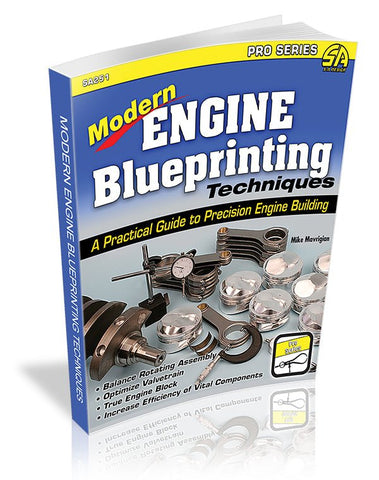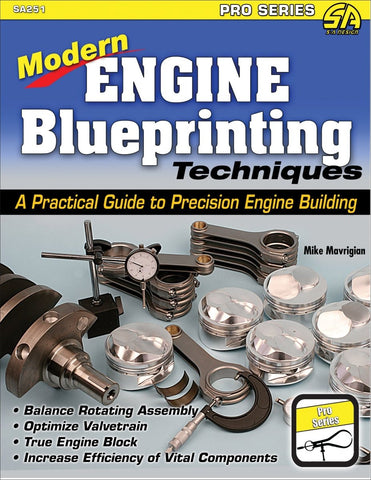In this book, expert engine builder and veteran author Mike Mavrigian explains and illustrates the most discriminating engine building techniques, so the engine is perfectly balanced, matched, and optimized. Balancing and blueprinting is a time consuming and exacting process, but the investment in time pays off with superior performance. Through the process, you carefully measure, adjust, machine and fit each part together with precision tolerances, optimizing the design and maximizing performance. The book covers the block, crankshaft, connecting rods, pistons, cylinder heads, intake manifolds, camshaft, measuring tools and final assembly techniques.
For more than 50 years, balancing and blueprinting has been an accepted and common practice for maximizing performance. An enthusiast or professional that invests the time to precisely build an engine in this fashion will be rewarded with an engine that will run strong and last for years. This book provides an unprecedented level of detail and instruction on the process of balancing and blueprinting your engine.
Acknowledgments
Introduction
Chapter 1:
Flaw Detection
Sonic Testers
Hand-Held Magnetic Particle Testers
Wet Mag Bench Testers
Dye Penetrant
Pressure Testing
Chapter 2:
Engine Blocks
Flaw Checking the Block
Decking the Block
Correcting Cylinder Bores
Oil Restrictors and Screens
Lifter Valley Surface
Rod and Crank Clearance
Oil Hole Alignment
Threaded Holes
Chapter 3:
Block Machining
Main Bore Align Honing
Deck Resurfacing
Cylinder Honing
Cylinder Boring
Plateau Finishing
Cylinder Bore Distortion
Lifter Bores
Hot Honing
Camshaft Bore
Chapter 4:
Oiling Systems
Wet Sump Systems
Dry Sump Systems
External Oil Coolers
Oil Restrictors
Oil Drainback
Intermediate Shaft
High-Pressure High-Volume Pumps
Pre-Lube Before Initial Startup
Chapter 5:
Engine Math
Bore and Stroke
Connecting Rod Length
Rod Ratio
Piston Compression Height
Compression Ratio (part 1)
Combustion Chamber Volume
Piston Dome Volume
Head Gasket Volume
Deck Height Volume
Cylinder Swept Volume
Compression Ratio (part 2)
Chapter 6:
Crankshafts
Crankshaft Types
Surface Hardening
Reducing Rotating Mass
Inspection
Stroker Clearance
Shot Peening
Stress Relieving
Counterweight Modifications
Cross Drilling
Chamfering Oil Holes
Chapter 7:
Connecting Rods
Rod Types
Center-to-Center Length
Piston-to-Rod Clearance
Rod-to-Block Clearance
Rod-to-Camshaft Clearance
Rod Bearing Clearance
Rod Side Clearance
Beam Design
Rod Bolt Tightening
Connecting Rod Inspection
Chapter 8:
Pistons
Performance Pistons
Piston-to-Wall Clearance
Piston Diameter
Piston Skirt to Crankshaft Clearance
Coatings
Piston Pins
Ring Grooves
Piston-to-Head Clearance
Piston-to-Valve Clearance
Piston Compression Distance
Compression Ratio
Deck Height
Gasket Volume
Piston Dome Volume
Combustion Chamber Volume
Valve Pockets
Ordering Custom Pistons
Chapter 9:
Piston Rings
Ring Types
Tension and Gap
Piston Ring Trends
Determining Ring Depth
Ring Installation Method
Chapter 10:
Camshafts
Cam Types
Protecting the Cam
Cam Runout
Cam Endplay
Degreeing the Cam
Adjusting Cam Timing
Lobe Separation Angles
GM LS Cam Lifters
Special Firing Order Camshafts
Camshaft Needle Bearings
Distributor Gears
Chapter 11:
Cylinder Heads
Cast Iron versus Aluminum
Deck Surface Finish
Deck Flatness
Valves
Ports and Runners
Finishing Bare Cylinder Heads
Inspection and Reconditioning
Flow Bench Testing
Cylinder Head Installation
Chapter 12:
Valves, Springs, Retainers and Locks
Valve Inspection
Valve Seats
Performance Valve Technology
Valvesprings
Retainer Fit
Valvespring Seats
Retainers and Locks
Chapter 13:
Rocker Arms
Rocker Arm Ratio
Guideplates
Roller Rockers
Rocker Arm Materials
OHC Followers
Valve Cover Clearance
Upgrading OEM LS Rocker Arm Trunnions
Chapter 14:
Pushrods
Check for Runout
Pushrod Length
Guideplates
Pushrod Diameter
Pushrod Wall Thickness
Pushrod End Types
Clean the Pushrods
Chapter 15:
Intake Manifolds
Manifold Types
Port Matching
Intake Plenum
Intake Port Surface
Manifold Bolts
Converting LS to Carb
Manifold Surface Protections
Carb Spacers
Chapter 16:
Balancing
Internal versus External Balance
Weight Matching
Bobweights
Balancing Procedures
Chapter 17:
Timing Systems
Chain Drive
Belt Drive
Gear Drive
Chapter 18:
Engine Performance Coatings and Treatments
Coating Types
Cryogenic Stress Relief
Vibratory Stress Relief
Hard Cylinder Coating
Source Guide
In this book, expert engine builder and veteran author Mike Mavrigian explains and illustrates the most discriminating engine building techniques, so the engine is perfectly balanced, matched, and optimized. Balancing and blueprinting is a time consuming and exacting process, but the investment in time pays off with superior performance. Through the process, you carefully measure, adjust, machine and fit each part together with precision tolerances, optimizing the design and maximizing performance. The book covers the block, crankshaft, connecting rods, pistons, cylinder heads, intake manifolds, camshaft, measuring tools and final assembly techniques.
For more than 50 years, balancing and blueprinting has been an accepted and common practice for maximizing performance. An enthusiast or professional that invests the time to precisely build an engine in this fashion will be rewarded with an engine that will run strong and last for years. This book provides an unprecedented level of detail and instruction on the process of balancing and blueprinting your engine.
Acknowledgments
Introduction
Chapter 1:
Flaw Detection
Sonic Testers
Hand-Held Magnetic Particle Testers
Wet Mag Bench Testers
Dye Penetrant
Pressure Testing
Chapter 2:
Engine Blocks
Flaw Checking the Block
Decking the Block
Correcting Cylinder Bores
Oil Restrictors and Screens
Lifter Valley Surface
Rod and Crank Clearance
Oil Hole Alignment
Threaded Holes
Chapter 3:
Block Machining
Main Bore Align Honing
Deck Resurfacing
Cylinder Honing
Cylinder Boring
Plateau Finishing
Cylinder Bore Distortion
Lifter Bores
Hot Honing
Camshaft Bore
Chapter 4:
Oiling Systems
Wet Sump Systems
Dry Sump Systems
External Oil Coolers
Oil Restrictors
Oil Drainback
Intermediate Shaft
High-Pressure High-Volume Pumps
Pre-Lube Before Initial Startup
Chapter 5:
Engine Math
Bore and Stroke
Connecting Rod Length
Rod Ratio
Piston Compression Height
Compression Ratio (part 1)
Combustion Chamber Volume
Piston Dome Volume
Head Gasket Volume
Deck Height Volume
Cylinder Swept Volume
Compression Ratio (part 2)
Chapter 6:
Crankshafts
Crankshaft Types
Surface Hardening
Reducing Rotating Mass
Inspection
Stroker Clearance
Shot Peening
Stress Relieving
Counterweight Modifications
Cross Drilling
Chamfering Oil Holes
Chapter 7:
Connecting Rods
Rod Types
Center-to-Center Length
Piston-to-Rod Clearance
Rod-to-Block Clearance
Rod-to-Camshaft Clearance
Rod Bearing Clearance
Rod Side Clearance
Beam Design
Rod Bolt Tightening
Connecting Rod Inspection
Chapter 8:
Pistons
Performance Pistons
Piston-to-Wall Clearance
Piston Diameter
Piston Skirt to Crankshaft Clearance
Coatings
Piston Pins
Ring Grooves
Piston-to-Head Clearance
Piston-to-Valve Clearance
Piston Compression Distance
Compression Ratio
Deck Height
Gasket Volume
Piston Dome Volume
Combustion Chamber Volume
Valve Pockets
Ordering Custom Pistons
Chapter 9:
Piston Rings
Ring Types
Tension and Gap
Piston Ring Trends
Determining Ring Depth
Ring Installation Method
Chapter 10:
Camshafts
Cam Types
Protecting the Cam
Cam Runout
Cam Endplay
Degreeing the Cam
Adjusting Cam Timing
Lobe Separation Angles
GM LS Cam Lifters
Special Firing Order Camshafts
Camshaft Needle Bearings
Distributor Gears
Chapter 11:
Cylinder Heads
Cast Iron versus Aluminum
Deck Surface Finish
Deck Flatness
Valves
Ports and Runners
Finishing Bare Cylinder Heads
Inspection and Reconditioning
Flow Bench Testing
Cylinder Head Installation
Chapter 12:
Valves, Springs, Retainers and Locks
Valve Inspection
Valve Seats
Performance Valve Technology
Valvesprings
Retainer Fit
Valvespring Seats
Retainers and Locks
Chapter 13:
Rocker Arms
Rocker Arm Ratio
Guideplates
Roller Rockers
Rocker Arm Materials
OHC Followers
Valve Cover Clearance
Upgrading OEM LS Rocker Arm Trunnions
Chapter 14:
Pushrods
Check for Runout
Pushrod Length
Guideplates
Pushrod Diameter
Pushrod Wall Thickness
Pushrod End Types
Clean the Pushrods
Chapter 15:
Intake Manifolds
Manifold Types
Port Matching
Intake Plenum
Intake Port Surface
Manifold Bolts
Converting LS to Carb
Manifold Surface Protections
Carb Spacers
Chapter 16:
Balancing
Internal versus External Balance
Weight Matching
Bobweights
Balancing Procedures
Chapter 17:
Timing Systems
Chain Drive
Belt Drive
Gear Drive
Chapter 18:
Engine Performance Coatings and Treatments
Coating Types
Cryogenic Stress Relief
Vibratory Stress Relief
Hard Cylinder Coating
Source Guide










